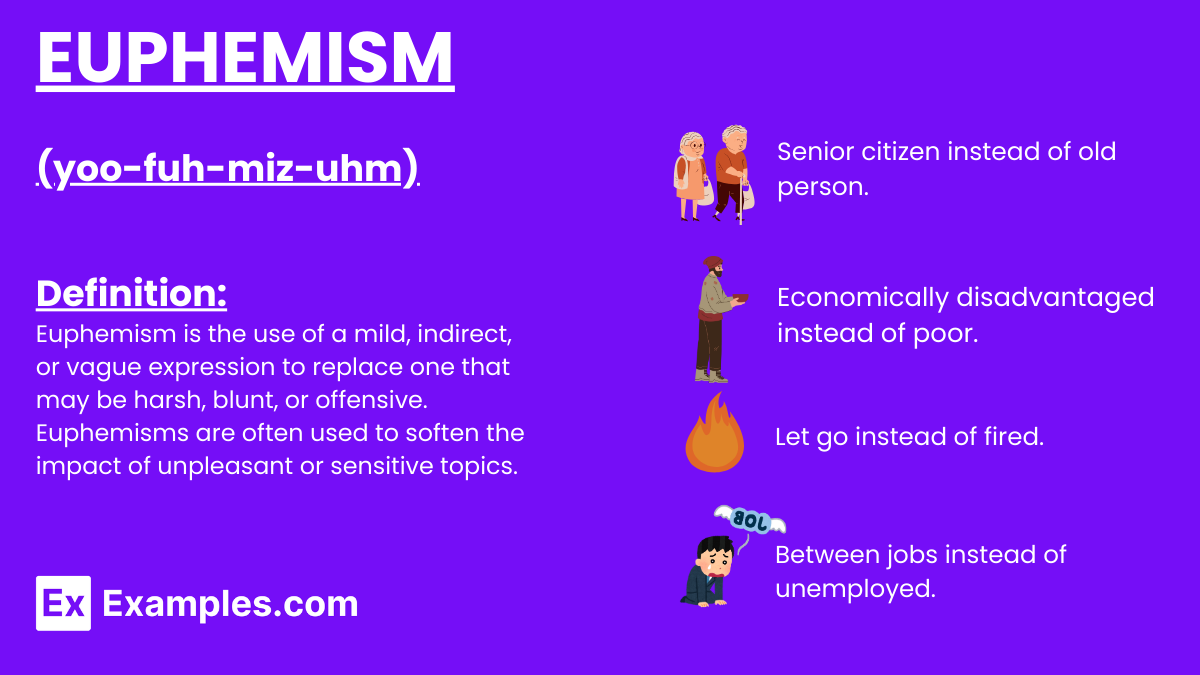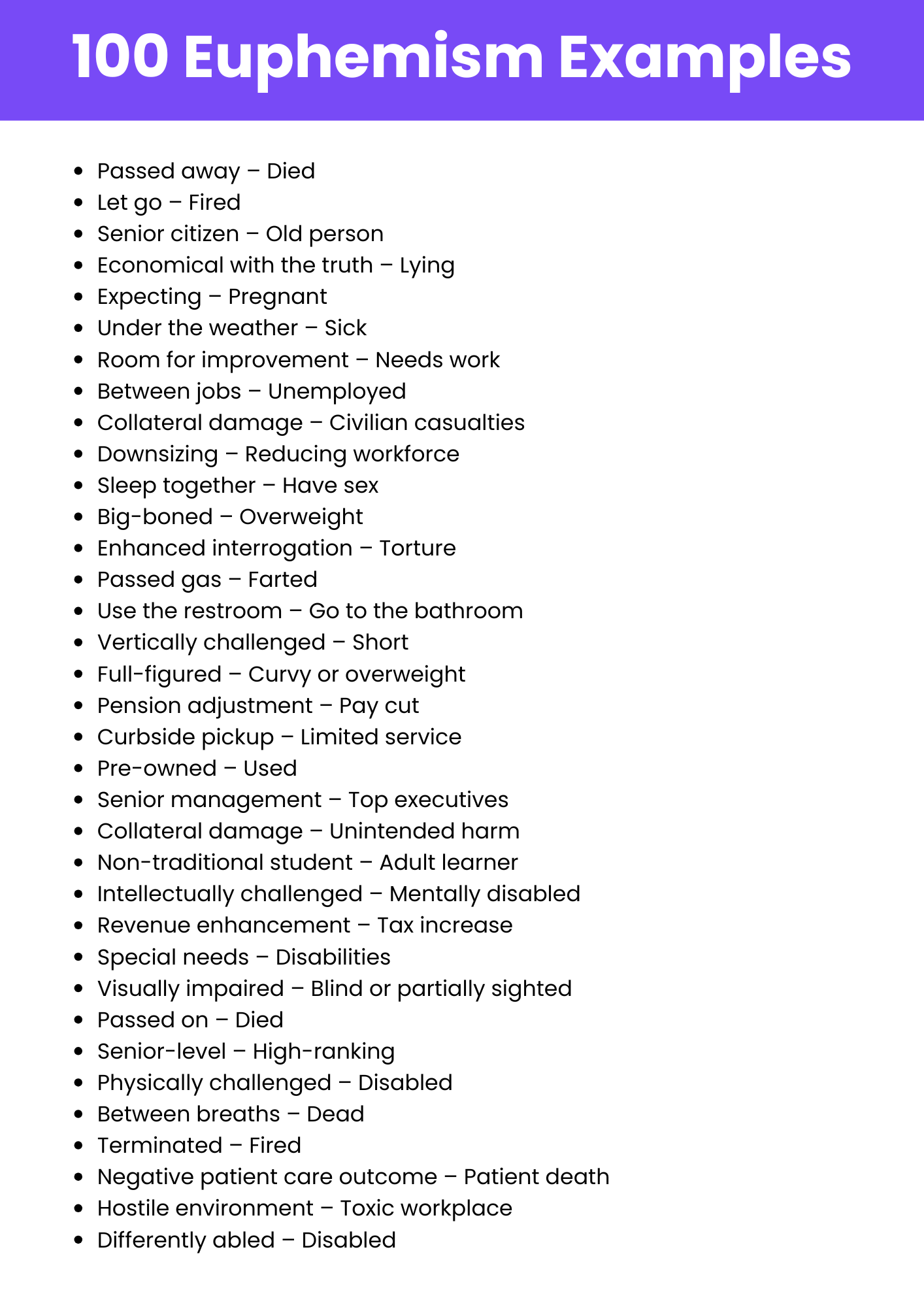Euphemism
What is Euphemism? – Definition
Euphemism is a literary device where a mild, indirect, or vague term is used to replace a harsh, blunt, or offensive one. This technique helps to soften the impact of the language, making it more palatable or socially acceptable.

Generated Euphemism Examples

Download Euphemism Examples
Enhance your understanding with our comprehensive PDF guide.
Download PDFExamples of Euphemism
- Passed away instead of died
- Let go instead of fired
- Economical with the truth instead of lying
- Big-boned instead of overweight
- Senior citizen instead of old person
- Downsizing instead of layoffs
- In a better place instead of deceased
- Enhanced interrogation instead of torture
- Residential facility instead of nursing home
- Revenue enhancement instead of tax increase
- Between jobs instead of unemployed
- Passed away instead of died
- Full-figured instead of fat
- Intimate apparel instead of underwear
- Pre-owned instead of used
Types of Euphemism
Offensive Euphemism
Uses a mild or indirect word or phrase to replace one that may be considered harsh or offensive.
- Passed away instead of died.
- Between jobs instead of unemployed.
- Senior citizen instead of old person.
- Full-figured instead of fat.
- Pre-owned instead of used.
Positive Euphemism
Uses a pleasant or favorable term to describe something that might otherwise be seen negatively.
- Enhanced interrogation instead of torture.
- Residential facility instead of nursing home.
- Economical with the truth instead of lying.
- Intimate apparel instead of underwear.
- In a better place instead of deceased.
Neutral Euphemism
Uses a term that is neither overtly positive nor negative, simply making the language less direct or harsh.
- Let go instead of fired.
- Between jobs instead of unemployed.
- Pre-owned instead of used.
- Senior citizen instead of old person.
- Enhanced interrogation instead of torture.
How to Identify/Find Euphemism?
To identify euphemism, look for terms or phrases that replace more direct or harsh language. These substitutes are often used to soften the impact of the message, make it more socially acceptable, or to obscure the reality of a situation.
- Look for words or phrases that seem milder or less offensive than the standard terminology.
- Identify replacements for sensitive topics such as death, illness, or financial loss.
- Consider the context in which the term is used to understand why a euphemism might be employed.
- Analyze whether the language is being softened to avoid discomfort or maintain politeness.
- Evaluate the effect of the euphemism on the tone and reception of the communication.
How to Use Euphemism?
Use euphemism to convey sensitive or potentially offensive information in a more palatable manner. This technique can help maintain a respectful tone, avoid discomfort, and navigate social or cultural taboos effectively.
- Replace harsh terms with milder ones to soften the message.
- Use euphemisms in descriptions to maintain a respectful or polite tone.
- Employ euphemism to address sensitive subjects without causing offense.
- Utilize euphemism to obscure uncomfortable truths or realities.
- Ensure that the euphemism serves a clear purpose in enhancing communication.
Other Literary Devices
Euphemism in Literature
Literary works often employ euphemism to address sensitive topics delicately, enhance character development, and maintain the narrative’s tone and style.
- In To Kill a Mockingbird by Harper Lee, “passed away” is a euphemism for dying.
- In The Book Thief by Markus Zusak, “taken by Death” means dying.
- In Brave New World by Aldous Huxley, “conditioning” refers to psychological control.
- In Pride and Prejudice by Jane Austen, “befriended by a gentleman” implies engagement.
- In Animal Farm by George Orwell, “proletarian revolution” is a euphemism for uprising.
Euphemism Examples for Kids
Introduce children to euphemism with simple and relatable examples that are easy to understand.
- Passed away instead of died.
- Using the restroom instead of going to the toilet.
- Big-boned instead of fat.
- Took a nap instead of sleeping.
- Put to sleep instead of euthanized.
Euphemism Examples for Students
Enhance students’ understanding of euphemism with examples that deepen their analytical skills and appreciation for literary devices.
- He was let go instead of being fired.
- She is expecting instead of being pregnant.
- Passed away instead of died.
- On the streets instead of homeless.
- Relocation instead of moving away.
Euphemism Examples for Class 4
Age-appropriate and relatable examples of euphemism for Class 4 students to grasp easily.
- Passed away instead of died.
- Took a break instead of quit.
- Big-boned instead of fat.
- Used the bathroom instead of going to the toilet.
- Passed out instead of fainted.
Explore Other Literary Devices
Elevate Your AP English Preparation
Unlock your potential with our comprehensive AP English exam preparation tools designed to help you excel.
- Extensive Question Bank: Access 900+ exam-like questions for both AP English Language and Literature.
- Expertly Crafted: Questions mirror the structure and difficulty of actual AP exams, ensuring relevant practice.
- Detailed Explanations: Understand your mistakes with clear, concise breakdowns of correct and incorrect answers.
- Personalized Learning: Tailor your study sessions with topic-specific tests and adaptive learning tools.
- Comprehensive Coverage: Master all aspects of the AP English curriculum with extensive guides and resources.
Frequently Asked Questions
-
What is euphemism in literature?
In literature, euphemism is a technique where a mild, indirect, or vague term is used to replace one that may be considered harsh, blunt, or offensive. This method helps to soften the impact of the language, making it more palatable or socially acceptable. -
How does euphemism differ from understatement?
While both euphemism and understatement involve altering language to change its impact, euphemism specifically replaces a term with a more gentle or neutral one to avoid offense. Understatement, on the other hand, minimizes the significance of something to achieve a particular effect. -
Can euphemism be used in visual arts?
Yes, euphemism can be employed in visual arts through symbolism and metaphors. Artists might use gentle imagery or abstract representations to convey sensitive or complex themes without being direct. -
What is an example of euphemism in movies?
An example of euphemism in movies is the term “passed away” used in place of “died” in films like *Finding Nemo*, where characters refer to lost loved ones in softer terms. -
Why is euphemism important in storytelling?
Euphemism is important in storytelling because it allows writers to address sensitive or potentially offensive topics with subtlety and tact. It helps maintain the narrative’s tone, develop characters by showing their sensitivity or politeness, and engage readers by prompting them to think about the underlying meanings. -
How can I effectively use euphemism in my writing?
To effectively use euphemism in your writing, choose terms that appropriately soften the message without diluting its meaning. Ensure that the euphemism aligns with the character’s voice and the story’s context. Use it sparingly to maintain its impact and avoid overusing it, which can make the writing seem evasive.

